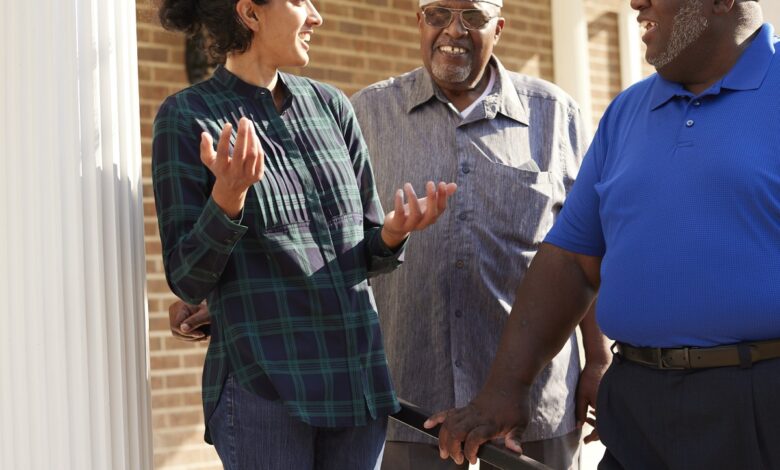Communities Leading Change

The Rural Opportunity Institute uses human-centered design to find innovative solutions to challenges in North Carolina
After serving as a Teach For America corps member in rural North Carolina, Vichi Jagannathan moved to Silicon Valley to work on scalable, tech-based solutions to educational disparities. She met up often to discuss ideas with Seth Saeugling, a fellow TFA alum who at the time worked for the Tipping Point Foundation’s T-Lab, a social innovation incubator in the Bay Area. Both were impressed by the immense resources and creativity being deployed to urban areas, but over time, they came to the same dispiriting realization: Rural students, like those they taught in North Carolina, simply weren’t part of the conversation.
What would be possible, they thought, if the dedicated, resilient leaders they knew in North Carolina could connect with the best practices and resources so abundant in the Bay Area?
“We often assume information flows from urban to rural, from wealthy to less wealthy,” Jagannathan says. “But what if we reversed that pattern? Those insights might be totally different. And they might scale even better to the problems that everybody is facing.”
In 2017, Jagannathan and Saeugling moved back to Edgecombe County, North Carolina. They founded the
“Having taught here, we knew there was a ton of knowledge, wisdom and insight in these communities—so much untapped potential,” Jagannathan says. “It wasn’t at all about ‘There’s a deficit. How do we fix it?’ It was more, what a tremendous opportunity to learn and support the folks who are already here doing the work and to improve their impact.”
After raising initial funds, ROI conducted design interviews with a broad swath of community stakeholders to identify pressing needs. They created a systems map to determine the most effective levers for impact. Over and over, they heard that traumatic events experienced or witnessed during childhood—abuse, food insecurity, addiction, having an incarcerated parent—profoundly affected children’s capacity to learn and thrive. Across generations, the ripple effects on the community were incalculable.
Success would be a world where our community has the resources and tools to self-determine their future.
Vichi Jagannathan
Together with input from their stakeholders, ROI developed a three-pronged strategy: educate community members about adverse childhood experiences (ACES) and the effects of toxic stress; teach restorative techniques for responding to trauma; and empower those who have been healed to become healers to others. Committed to making sure community members were the ones driving the change, ROI found a local partner with the expertise to help lead the effort. In close partnership with Asheville, North Carolina-based Resources for Resilience, ROI has provided free trainings on trauma-informed practices to more than 15,000 community members across Edgecombe County.
The program educates participants on the basics of ACES and trauma and teaches techniques for responding constructively. Nearly all Edgecombe County Public Schools staff have received the training—from teachers to social workers to school resources officers—as well as a large number of healthcare providers and law enforcement officers.
The primary focus on adults is intentional. “It’s like putting on an airplane oxygen mask,” Jagannathan says. “Adults need to put on their own mask before they can assist the child. A lot of adults have unaddressed trauma that gets triggered when they’re interacting with a child in trouble. We’re helping them regulate their own stress reaction so they’re equipped to stay in the moment and deliver a more restorative response to the child.”
ROI has also invested in training a cohort of 25 local leaders—parents, educators, faith leaders, elected officials and healthcare workers—to become certified resilience trainers. In turn, they have shared the program within their own circles and organizations. “It was important to us that it wasn’t outsiders coming in and doing intervention,” Saeugling says.
ROI’s systems-mapping process also revealed a pervasive mistrust of public agencies from the communities they serve. In response, ROI launched the Resilient Leaders Initiative (RLI), the first social innovation accelerator program based in the rural South. RLI works exclusively with public agencies to help them design and pilot new trauma-informed programs and policies to build trust and enhance support for their staff and constituents.
In 2019, ROI piloted a biofeedback program at a middle school to help students who were struggling with behavior issues to manage anxiety and negative feelings. For just 10 minutes, at the beginning and end of each school day, the kids wore a small heart-rate sensor paired with an app that guided them through personalized breathing exercises to help them self-regulate and calm down. It’s a technique widely used by elite athletes, NASA astronauts and CEOs. The pilot saw a 57% decrease in reported anxiety and an increase in attendance, positive behaviors and academic outcomes. They are currently expanding the program with pilots at an Edgecombe County juvenile detention center and an after-school YMCA program.
ROI sees the work of lifting the community as an all-hands on deck endeavor. All of their learnings, best practices and materials are open source. They hired local illustrators to create flashcards and posters depicting resilience tools from their trainings that have been downloaded more than 1,000 times. In partnership with the University of North Carolina at Chapel Hill, ROI provides a biofeedback guide for free on their website that has been downloaded and shared with more than 90,000 people.
ROI’s founders believe the strength of their approach comes from the community itself. “We didn’t come back to North Carolina with a specific solution, which is how a lot of social entrepreneurship happens,” Saeugling says. “We came back with a process that was based in listening to community members and building empathy.”
For their part, Jagannathan and Saeugling are hoping to work themselves out of a job. “Success would be a world where our community has the resources and tools to self-determine their future,” Jagannathan says. “That means reshaping the systemic infrastructure around them to be supportive instead of oppressive, so that they have the ownership and power to drive what happens next.”

